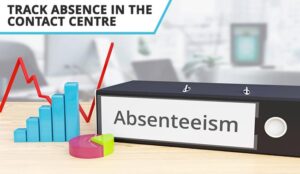Poor attendance in the contact centre can have a negative impact on everything from team morale to schedule adherence. Here are 5 ways to help manage the issue.
1. To be the good cop and the bad cop: phone your absentees at home
This is a great way to actively show concern, while still casting your net for any sickie suspects.
If Adam called in sick at 8am, give him a quick call on his home phone between 12 and 3pm – just to see how he’s doing. If he’s tucked up in bed with a mug of honey and lemon, he’ll be able to answer the phone and give you an update on his condition – thus helping you plan resources for the following day.

If, however, he’s on a train to Stamford Bridge with tickets for that evening’s FA cup quarter-final in his pocket, he won’t be answering the phone. Nor will he be answering the phone if he’s collapsed in the shower and is now unconscious on the bathroom floor. For both these reasons, it’s a good idea to visit Adam at home if he’s not answering his home phone.
Once this becomes established practice, your employees know you’ll show genuine concern when they’re ill. They’ll also be acutely aware that they can’t take their home phones with them on a day trip to Paris.
2. To better understand the problem: apply the ‘Bradford factor’
The Bradford Factor is a formula that assigns a numerical value to how disruptive a person’s absenteeism is.
The Bradford Factor takes into account not just how many days a person is absent, but also how many periods of absence they’ve had.
It works on the principle that regular, short periods of absence are more damaging to a team’s productivity than fewer, longer periods. For example, a person who’s had two weeks off with a back injury will have caused less disruption than someone who’s called in sick seven Mondays in a row – fewer days absent, but more disruption.
It’s not perfect, but the Bradford Factor will help you determine whose absence is a greater concern to the productivity of your team.
3. To show appreciation: reward good attendance

There are lots of different things you can do to recognise good attendance:
- You can give yearly certificates to anyone with 100% attendance – that always looks good on a personnel file or in a job interview.
- You can (if you have the budget) arrange a fancy lunch every quarter for those with the best attendance.
- You can authorise a double-length lunch break or an early finish on the anniversary of three months (or however long) since an agent’s last absence.
Okay, so you can’t expect to completely transform your attendance levels with these little rewards, but it shows the people with good attendance that their efforts don’t go unnoticed. And some of these little rewards – especially the last one – can often be the difference between “Oh man, *sniff* this is going to be a tough day” and “Stuff this, I’m feeling too rough for work today”.
4. To reduce ‘sickies’: harness the power of peer pressure
Because it’s not the management who suffer most from high absenteeism, is it? It’s always the other agents who have to pick up the slack for their missing comrades.
So it can help to make this very clear. When you set team targets and circulate statistical summaries, make a point of mentioning anything that’s posed an extra challenge to the team – including absenteeism.
This applies pressure to agents and makes them feel like they’re letting their team down if they’re off sick. That may seem a tad harsh, but you’ve got to trust your agents’ abilities to self-police here, to an extent. When they know someone is genuinely sick, they won’t hold it against them.
But when they think someone is bending the truth – headaches referred to as ‘migraines’, mild colds written up as ‘flu’ – or just brazenly pulling a sickie, peer pressure can sometimes be a better enforcer than managerial pressure.
5. To get the admin right: always do ‘return to work’ interviews
But don’t call them that. A back to work ‘interview’ makes it sound like an interrogation. Back to work ‘meetings’ or ‘briefings’ sound much more friendly.

Matt Phil Carver
The back to work meeting makes sure there is no miscommunication or ambiguity over a period of sickness. You sit down with the returning person and fill out a form that records when they were absent, how long for and for what reason. Make sure you get a signature on the bottom. So if there are any disciplinary issues to be addressed later on, the facts are never up for debate.
Combine the return to work meeting with a ‘here’s what you’ve missed’ briefing – that’ll make it seem much less interrogatory.
Do you have any good tips for tackling staff absence?
Let us know in the comments below.
With thanks to Matt Phil Carver, a regular contributor to Call Centre Helper
Author: Megan Jones
Published On: 27th May 2015 - Last modified: 13th Aug 2025
Read more about - Workforce Planning, Absenteeism, Editor's Picks, Employee Engagement, Matt Phil Carver, Workforce Planning

















With regard to the point on rewarding presenteism. We used to do this but were warned that it would look like we were penalizing people with genuine absence issues. Where does company stand from an HR perspective on this one?
We run a 24/7 emergency services centre of 270 staff. We have a robust absence management policy that can (and does) lead to dismissal when the absences become unsustainable. (Although this does take a long time and requires the employer to have done absolutely everything to try to assist the employee to remain in the workplace). It is a minefield and you need to know your HR stuff too. It helps if your organisation has a clear absence management policy. Most of our staff at some stage of the policy.
Fine until some one hauls themselves in with REAL flu and infects the entire workforce
Some good ideas here and several that I have used in the past. Every company should have a clear process for managing absence and Team Leaders and Managers need to be trained in it, just like any other process – in my experience very few Contact Centres actually train their Managers in this respect, yet the returns can be enormous! The most important thing though is for the Manager to lead by example. I’ve done many surveys on this and without exception, Managers who have very low or no sickness have teams with the lowest absence records too. One other thing, it’s an important part of the recruitment process too – ask how many days they have had off in the last year – and check up on it!
we base our sales agents on a rolling 3 week average. if they call in sick they are required to bring in a doctors certificate, if they don’t then we count the day towards their 3 week average. the higher the average, the better leads and incentives they receive.
The problem with this article as with most of the comments is that you are all looking at absence as a negative and that most people are swinging the lead. The best way to manage absence is to support people so that the absence doesnt happen in the first place. Organisations are too quick to ignore stress, mental health issues and other patterns of concern. Instead the employee goes off sick, once and as it doesnt hit a trigger no one worries about it, but the underlying issue has not been resolved, the person will be sick again. As companies we are great at managing an absence process, but not so great at the grey areas and the application of common sense, treating someone as an individual?
Interesting view from Matt Phil Carver. Top idea to visit staff at home on their first day of sickness if they fail to answer their landline. But like all call centre managers he hasn’t looked past his brainwave.
What if they are at the doctors/hospital/walk in centre or pharmacists. If they don’t answer what you going do ? Ring the police/fire/ambulance.
Stop behaving like the secret police and foster an atmosphere in the CC where staff don’t want to report sick. Encourage and nurture staff, treat time off requests sympathetically, let agents come higher up your list of priorities and maybe just maybe staff will prove to be loyal, committed and less prone to take odd days off.
So sorry Matt leave the CC behind and use your few skills you have in a more appropriate environment like the Prison service.
I especially like the the part about back to work meeting. I find that a lot of the sayings here can help me also in the hotel housekeeping department where I am the Executive Housekeeper. Thank you very much.
Hi Matt,
Currently working in WFM and we are noticing people are either calling in sick for the start of their shifts and then wanting to come in late for their shifts. Or agents will start feeling unwell halfway through their shift and want to leave early.
Where do you draw the line on agents coming in on their own time? currently we are denying any requests for this as we are afraid this will create a stigma amongst our agents in that they can start to essentially “create their own shifts/roster” by calling in sick or leaving early.
Should we stand ground on this or approve such request’s to maintain employee satisfaction?
Any tips on how we create the right behaviours for this one?
Thanks
Generally where possible you should be as flexible as possible in allowing staff to take time off. You may find that your scheduling system is too rigid so that if somebody needs to leave early (for example to pick up a child or visit the dentist) they feel that they have to pretend not to feel well.
One solution is to allow staff to trade cover for each other in a shift swap system. Obviously you still need to police things – particularly around coming in late.